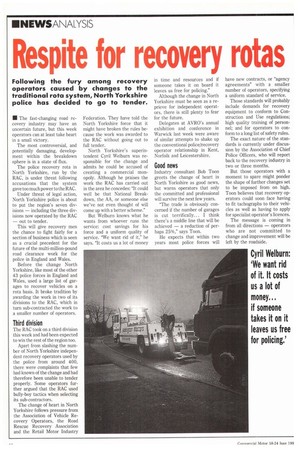Respite for recovery rotas
Page 18

If you've noticed an error in this article please click here to report it so we can fix it.
• The fast-changing road recovery industry may have an uncertain future, but this week operators can at least take heart in a small victory.
The most controversial, and potentially damaging, development within the breakdown sphere is in a state of flux.
The police recovery rota in North Yorkshire, run by the RAC, is under threat following accusations that the system gave too much power to the RAC.
Under threat of legal action, North Yorkshire police is about to put the region's seven divisions — including the three divisions now operated by the RAC — out to tender.
This will give recovery men the chance to fight fairly for a section of business which is seen as a crucial precedent for the future of the multi-million-pound road clearance work for the police in England and Wales.
Before the change North Yorkshire, like most of the other 43 police forces in England and Wales, used a large list of garages to recover vehicles on a rota basis. It broke tradition by awarding the work in two of its divisions to the RAC, which in turn sub-contracted the work to a smaller number of operators.
The RAC took on a third division this week and had been expected to win the rest of the region too.
Apart from slashing the number of North Yorkshire independent recovery operators used by the police from around 400, there were complaints that few had known of the change and had therefore been unable to tender properly. Some operators further argued that the RAC used bully-boy tactics when selecting its sub-contractors.
The change of heart in North Yorkshire follows pressure from the Association of Vehicle Recovery Operators, the Road Rescue Recovery Association and the Retail Motor Industry Federation. They have told the North Yorkshire force that it might have broken the rules because the work was awarded to the RAC without going out to full tender.
North Yorkshire's superintendent Cyril We[burn was responsible for the change and admits he could be accused of creating a commercial monopoly. Although he praises the work the RAC has carried out in the area he concedes: "It could well be that National Breakdown, the AA, or someone else we've not even thought of will come up with a better scheme."
But Welburn knows what he wants from whoever runs the service: cost savings for his force and a uniform quality of service. "We want rid of it," he says. "It costs us a lot of money in time and resources and if someone takes it on board it leaves us free for policing."
Although the change in North Yorkshire must be seen as a reprieve for independent operators, there is still plenty to fear for the future.
Delegates at AVRO's annual exhibition and conference in Warwick last week were aware of similar attempts to shake up the conventional police/recovery operator relationship in Kent, Norfolk and Leicestershire.
Industry consultant Bob Toon greets the change of heart in North Yorkshire as good news, but warns operators that only the committed and professional will survive the next few years.
"The trade is obviously concerned if the number of garages is cut terrifically... I think there's a middle line that will be achieved — a reduction of perhaps 25%," says Toon.
He expects that within two years most police forces will have new contracts, or "agency agreements" with a smaller number of operators, specifying a uniform standard of service.
Those standards will probably include demands for recovery equipment to conform to Construction and Use regulations; high quality training of personnel; and for operators to conform to a long list of safety rules.
The exact nature of the standards is currently under discussion by the Association of Chief Police Officers, who will report back to the recovery industry in two or three months.
But those operators with a moment to spare might ponder the shape of further changes set to be imposed from on high. Toon believes that recovery operators could soon face having to fit tachographs to their vehicles as well as having to apply for specialist operator's licences.
The message is coming in from all directions — operators who are not committed to change and improvement will be left by the roadside.




















































































